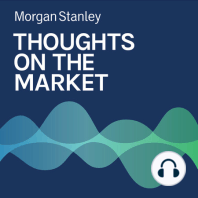3 min listen

Credit: The ‘Income’ is Back in Fixed Income
Credit: The ‘Income’ is Back in Fixed Income
ratings:
Length:
8 minutes
Released:
May 3, 2022
Format:
Podcast episode
Description
Credit markets are facing various headwinds, including policy tightening and slowing growth, and credit investors are looking for where they might see the best risk adjusted returns. Chief Cross-Asset Strategist Andrew Sheets and Global Director of Fixed Income Research Vishy Tirupattur discuss.-----Transcript-----Andrew Sheets: Welcome to Thoughts on the Market. I'm Andrew Sheets, Morgan Stanley's Chief Cross-Asset Strategist. Vishy Tirupattur: And I am Vishy Tirupattur, Global Director of Fixed Income Research. Andrew Sheets: And today on the podcast, we'll be talking about the challenges facing credit markets. It's Monday, May 2nd at 1 p.m. in London. Vishy Tirupattur: And 8 a.m. in New York. Andrew Sheets: So Vishy, it's great to have you back on the show because I really wanted to speak to you about what's been happening in credit markets. There's been a lot of volatility across the whole financial landscape, but that's been particularly acute in fixed income and we've seen some large moves in credit. So maybe before we get into the rest of the discussion, let's just level set with what's been happening year to date across credit. Vishy Tirupattur: It's been a really rough ride to credit investors. Investment grade returns are down 12% for the year and for high yield investors are down 6% for the year and leveraged loan markets are up slightly, 1.4% up for the year. So pretty dramatic differences across different segments of the credit markets. Higher quality has significantly underperformed lower quality. Andrew Sheets: So Vishy where I think this is also interesting is that investors in other asset classes often really look to credit as both a warning sign potentially to other markets and as an overall indicator in the health of the economy, so when you think about what's been driving the credit weakness, you know, how much of it is a economic concern story? How much of it is an interest rate story? How much of it is other things? Vishy Tirupattur: Andrew, we should always remember that the total returns to bond investors come from two parts. There's an interest rate component and there is a credit quality component. And what has driven the markets thus far in the year is really higher interest rates. As you know, Andrew, interest rates have dramatically increased from the beginning of the year to now, and a lot of expectations of future interest rates is already reflected in price. Those higher interest rate expectations have really contributed to the underperformance of the higher quality bonds, which tend to be a lot more interest rate sensitive than the lower quality bonds. The lower quality bonds tend to be a lot more sensitive to perceptions of the quality of the credit, as opposed to the level of interest rates. And that is really what explains the market moment thus far. Andrew Sheets: So Vishy, after such a tough start to the year for credit, do you think those challenges persist and do you think we see the same pattern of performance, of investment grade underperforming high yield which is underperforming loans, translate over the rest of the year? Vishy Tirupattur: Andrew I think that is a change that is afoot here. A pretty aggressive rate of interest rate hikes is already priced into the interest rate market. Even though investment grade returns have been affected negatively, predominantly by higher level of interest rates, going forward we think that is changing. I think we are going to see changes in the expectations of credit worthiness of bonds, the credit risks in the tail parts of the credit markets taking a greater significance in terms of credit market returns going forward. Andrew Sheets: So in essence, Vishy, we've just had a period where higher quality credit has underperformed as interest rates have been the main factor driving bonds. But looking ahead, that interest rate move is, we think, largely done for the time being, whereas the market might start to focus more on the extra risk premium th
Released:
May 3, 2022
Format:
Podcast episode
Titles in the series (100)
Mike Wilson: Why Trade Tensions Are Only Part of the Story by Thoughts on the Market